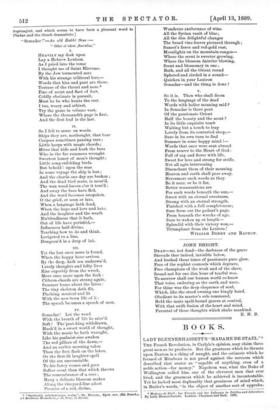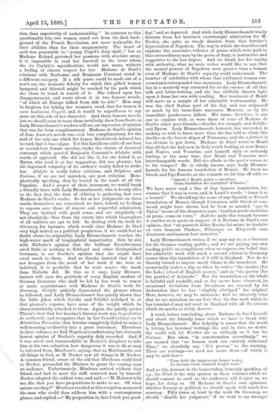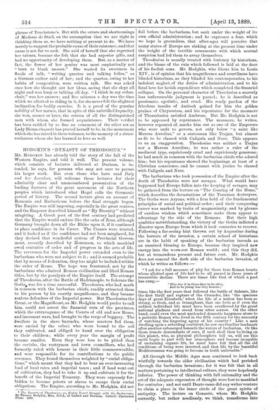BOOKS.
LADY BLENNERHASSETT'S "MADAME DE STAEL."* THE French Revolution, in Carlyle's opinion, may claim three great men as its products. But the greatness which he thrusts upon Danton is a thing of naught, and the estimate which he formed of Mirabeau is not proof against the sarcasm which described that orator as " capable of anything, even of a noble action—for money." Napoleon was, what the Duke of Wellington called him, one of the cleverest men that ever lived, and the greatness which he achieved is incontestable. Yet he lacked most deplorably that greatness of mind which, in Butler's words, "is the object of another sort of approba- • Madame de Stal I: her Friends and her Influence in Politics and Literature. By Lady Blennerbassett. London: Chapman and Ball. 18:28. tion, than superiority of understanding." In contrast to this questionable trio, two women stand out from the dark back- ground of the French Revolution, not more noticeable for their abilities than for their magnanimity. The heart of each was penetrable to " young Cupid's fiery shaft ;" but as Madame Roland governed her passions with absolute sway, it is impossible to read her farewell to the lover whom she (to Carlyle's mystification) would not name, without a feeling of sincere respect for her. Madame de Stael's relations with Narbonne and Benjamin Constant stand in a different category. If a silk purse could be made out of a sow's ear, the domestic felicity for which this gifted woman hungered and thirsted might be reached by the path which she chose to tread in search of it. She refined upon her disappointment, and wrote about it in two famous novels, " of which all Europe talked from side to side." Men may be forgiven for taking her woman's word, that for women is cceur bouleverse l'esprit, and it would be superfluous to say more on this side of her character. And those famous novels, lest we should seem to treat them cavalierly, drew from Scott, as Lady Blennerhassett's readers will see, an expression of opinion that was far from complimentary. Madame de Stael's opinion of Jane Austen's novels was even less complimentary, for she said of the only one which Sir James Mackintosh induced her to read, that it was vulgar. Yet this fastidious critic of our best or second-best female novelist, broke the chorus of deserved contempt which greeted Benjamin Constant's Adolphe, with words of approval. She did not like it, for she found it, as Byron, who read it at her suggestion, did, too gloomy ; but the ingrained vulgarity of its author's vanity failed to strike her. Adolphe is really below criticism, and Delphine and Corinne, if we are not mistaken, are past criticism. Meta- phorically speaking, they lie buried in the tomb of all the Capulets. And a propos of their interment, we would break a friendly lance with Lady Blennerhassett, who is keenly alive to the fact that the dust of oblivion is gathering fast over Madame de Stael's works. So far as her judgments on those works themselves are concerned, we have, indeed, no feelings to express save those of sincere and respectful admiration. They are instinct with good sense, and are singularly—if not absolutely—free from the errors into which biographers of all calibres are apt to fall. In dealing with the work On Germany, for instance, which would class Madame de Stael very high indeed as a political prophetess, if we could feel no doubt about its originality, Lady Blennerhassett touches the high-water mark of biographical impartiality. Side by side with Niebuhr's opinion that the brilliant Frenchwoman owed little or nothing to Schlegel and other distinguished Germans, is set Goethe's opinion that she might have owed much to them. And as Goethe insisted that it did not derogate from the merit of her work if she were so indebted, it is probable that he went nearer the mark than Niebuhr did. Be this as it may, Lady Blenner- hassett will earn the gratitude of every English student of German literature who shall be led by her work to renew or make acquaintance with Madame de Stael's work On Germany. Carlyle unfairly depreciated the pioneer whom he followed, and Lady Blennerhassett has quietly shown that the little jokes which Goethe and Schiller indulged in at that pioneer's expense have none of the weight which he characteristically attached to them. Again, she quietly quotes Thiers's view that her heroine's literary work was la perfection de mediocrito, and recognises that in her Considerations sur la Revolution Frangaise, that heroine completely failed to raise a well-meaning mediocrity into a great statesman. Elsewhere in these volumes, we find Napoleon's unflattering but obviously honest opinion of Necker's capacity duly recorded. And if it was sweet and commendable in• Necker's daughter to take him at his own valuation, how dangerous it was to do so may be inferred from Mirabean's saying, that as Malebranche saw all things in God, so M. Necker saw all things in M. Necker. A common friend, aware of the aid that Mirabean could lend to Necker, persuaded the Minister to grant the coming man an audience. Unfortunately, Mirabeau arrived without that friend, and had to meet the stiff, reserved man by himself. Necker adopted the coldest tone, and said :—"M. Malonet tells me, Sir, that you have propositions to make to me. Of what nature are they?" Mirabeau recoiled at this reception, measured the man who could thus address him with a contemptuous glance, and replied :—" My proposition is, that I wish you good-
day," and so departed. And while Lady Blennerhassett wisely dissents from her heroine's overwrought admiration for M. Necker, she quite as wisely dissents from that heroine's depreciation of Napoleon. The way in which she describes and explains the successive tributes of praise which were paid to that extraordinary man by the poets of Italy, is instructive and suggestive to the last degree. And we thank her for saying with authority, what no male writer would like to say, that the mental powers of Napoleon were greater than a woman even of Madame de Stael's capacity could understand. The number of celebrities with whom that celebrated woman con- versed and corresponded was enormous. Lady Blennerhassett has in a masterly way extracted for us the essence of all that talk and letter-writing, and she has skilfully thrown light upon it from her own wide reading. Her treatment of Monti will serve as a sample of her admirable workmanship. He was the chief Italian poet of his day, and was surpassed as much by his immediate successor, Manzoni, as by his immediate predecessor, Alfieri. His name, therefore, is not one to conjure with, as were those of some of Madame de Stael's other poet-friends,—Goethe, for example, and Schiller and Byron. Lady Blennerhassett, however, has succeeded in making us wish to know more than she has told us about this dweller on the lowest slopes of Parnassus, and the a fortiori is too obvious to put down. Madame de Stael wrote to Monti that all that she had seen in Italy worth looking at were Rome, and Naples, and Vesuvius, and himself, slyly or seriously hinting, at the same time, that Monti and Vesuvius were interchangeable words. Did she allude to the poet's verses, or to his temper ? He is chiefly known, says Lady Blenner- hassett, for his famous translation of Homer. He knew no Greek, and Ugo Foscolo, as she reminds us, hit him off with :— " Questi 6 Monti, poeta e cavaliero, Gran traduttor dei traduttor' d'Omero."
We have never read a line of that famous translation, but assume that it was in verse, and, in Lamb's words, " damn it at a hazard." We should say the same of any Spanish or French translation of Homer, though Cervantes, with Greek at com- mand, might have shown, had he been so minded, " que la Epics," as one of his characters says, " tambien puede escrivirse en prom, como en verso." And we make this remark because it enables us to quote in support of it Madame de Stael's own opinion, that "on pourrait defier Racine lui-meme de traduire en vers francais Pindare, Petrarque ou Klopstock sans denaturer entierement leur cara,ctere."
Lady Blennerhassett writes, if we may say so, as a German for the German reading public ; and we are paying our own reading public no compliment when we express our belief that her admirable work will reach a second edition in Germany sooner than this translation of it will in England. Nor do we thereby intend to impute much blame to the translator. He occasionally makes a slip, as when he writes " the marine [for the Lake] school of English poetry," and on " the poetry [for the poetics] of Aristotle." But his translation on the whole is faithful and readable, and so far as we have observed, its occasional deviations from literalness are covered by his declaration that he has "slightly abridged" his original. Here, however, we may be mistaken ; and we sincerely trust that we are mistaken, in our fear that the fine work which he has translated may not meet in England with all the success which its merits so richly deserve.
A word, before concluding, about Madame de Staid herself, and about the friendly lance which we have to break with Lady Blennerhassett. Her ladyship is aware that the world is letting her heroines' writings die, and in time, no doubt, the world will let Werther die as willingly as it has let Corinne. But when, "in concatenation accordingly," we are warned that "no human work can entirely withstand Time," we cheerfully say, "Not proven," to the warning. There are writings—we need not name them—of which it may be said that— "Time doth the impression- deeper make,
As streams their channel deeper wear."
And as this distrust in the immortality, humanly speaking, of e.g., the Iliad, is the only opinion in these volumes which we should venture to cavil at, the authoress will forgive us, we hope, for doing so. Of Madame de Stael's own opinions, whether literary or political, we should speak with much less courtesy. Fifty times at least in the work On Germany, we should " disable her judgment," if we went to no stronger phrase of Touchstone's. But with the errors and shortcomings of Madame de Stael, on the assumption that we are right in thinking them so, we have nothing at present to do. We have merely to suggest the probable cause of their existence; and that cause is not far to seek. She said of herself that she regretted her talents, because she felt that she had superior gifts, and had no opportunity of developing them. But, as a matter of fact, the flower of her genius was most emphatically not " born to blush unseen." She wasted its sweetness in floods of talk, " writing quartos and talking folios," as a German author said of her ; and the quartos, owing to her habits of composition, were written talk. She was asked once how she thought out her ideas, seeing that she slept all night and was busy or talking all day. " I think in my sedan- chair," was her answer ; and five minutes a day was the time which we allotted to riding in it, for she never felt the slightest inclination for bodily exercise. It is a proof of the genuine nobility of her nature, that in spite of this unbridled loquacity, she won, sooner or later, the esteem of all the distinguished men with whom she formed acquaintance. Their verdict has been ratified by so fine an ornament of the other sex as Lady Blennerhassett has proved herself to be, in the monument which she has raised in these volumes, to the memory of a sister- authoress whom she has learned to love so well.




































 Previous page
Previous page